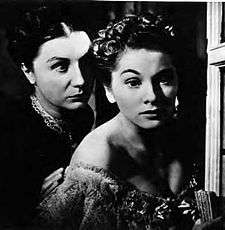Mrs. Danvers

Mrs. Danvers (whose first name is never given) is the main antagonist of Daphne du Maurier's 1938 novel Rebecca. Danvers is the head housekeeper at Manderley, the stately manor belonging to the wealthy Maximillian "Maxim" de Winter, where he once lived with his first wife, the eponymous Rebecca.
Nicknamed "Danny" by Rebecca, Mrs. Danvers was Rebecca's maid as a child and following the death of her previous mistress, persecutes the new Mrs. de Winter. Danvers resents the new Mrs. de Winter, convinced she is trying to "take Rebecca's place" despite the two women never meeting and being nothing alike. She also resents Maxim for remarrying, and she tries to break up the marriage. Late in the story she suggests that Mrs. de Winter wear a particular dress to a costume ball knowing Rebecca wore it to the costume ball the year before. It angers Mr. de Winter, and when the new wife confronts Mrs. Danvers about her deception Mrs. Danvers attempts to manipulate her into jumping out of the second floor window.
Mrs. Danvers' devotion to Rebecca was not as mutual as Mrs. Danvers believed it to be. Rebecca kept secrets from Danvers as well, including her cancer and the fact Maxim knew about her affairs. In the end, having failed to break up the marriage, Mrs. Danvers disappears and soon after Manderley is set on fire. In the book's final scene, Maxim and Mrs. de Winter are driving back from London and see their beloved home in flames. In the novel, Mrs. Danvers' fate is unknown.
Portrayal on film
Mrs. Danvers was first, and most famously, portrayed by Judith Anderson in Alfred Hitchcock's film adaptation released in 1940. She was nominated for an Academy Award for Best Supporting Actress, but lost to Jane Darwell for The Grapes of Wrath. Mrs. Danvers would later be played by several actresses for television adaptations, such as Dorothy Black in 1947, Nina Foch in 1962, Anna Massey in 1979, Diana Rigg in 1997, and by Mariangela Melato in an Italian language adaptation.
Changes from the book
In the book, Mrs. Danvers is given a back story. In contrast, the Hitchcock and all subsequent film adaptations never mention her past. Furthermore, the book depicts her as having a "skull's face" with high cheekbones and sunken eyes; these traits are not exhibited in the film versions.
Lesbian overtones
In the 1996 documentary The Celluloid Closet, screenwriter Susie Bright suggests Mrs. Danvers harbored romantic and sexual feelings for the late Rebecca. Bright cites a scene in which Danvers shows Rebecca’s underwear drawer to the new Mrs. de Winter, showing how easily one can see her hand through the garment.
Mrs. Danvers in popular culture
In film
Frau Blücher, portrayed by Cloris Leachman in Mel Brooks' 1974 film Young Frankenstein, is a parody of Mrs. Danvers.
In music
The LGBT-related band Mrs. Danvers takes its name from the character.
In print
Val McDermid's modern retelling of Jane Austen's Northanger Abbey mentions Mrs Danvers.
Stephen King's book, Bag of Bones, alludes to the character Mrs. Danvers numerous times. Mrs. Danvers serves as something of a bogeyman for the main character, Mike Noonan. King also uses the character's name for the chilly, obedient servant in "Father's Day," a tale in his 1982 film Creepshow. In Jasper Fforde's Thursday Next series, in the book world, they have accidentally made Mrs. Danvers clones, which they use as troops against The Mispeling Vyrus. In Adrian Mole and the Weapons of Mass Destruction, Adrian refers to his current girlfriend Marigold Flowers as having the same driving force of Mrs. Danvers.
In video game
In the Capcom Game Haunting Ground the character Daniella is inspired by the character.
External links
- Mrs. Danvers at the Internet Movie Database
- Article about sexual ambiguity in "Rebecca", by Cathy Pryor in the London Independent
- Rebecca Book Notes at Literapedia